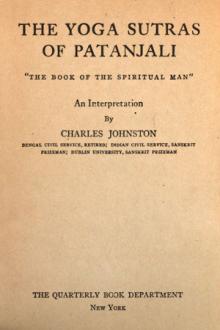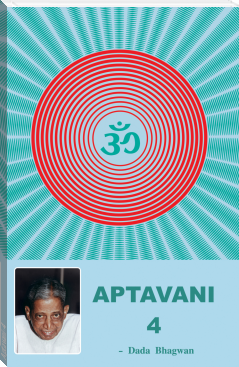The Yoga Sutras of Patanjali - Patañjali (ready to read books txt) 📗

- Author: Patañjali
- Performer: -
Book online «The Yoga Sutras of Patanjali - Patañjali (ready to read books txt) 📗». Author Patañjali
14. This becomes a firm resting-place, when followed long, persistently, with earnestness.
We must seek spiritual life in conformity with the laws of spiritual life, with earnestness, humility, gentle charity, which is an acknowledgment of the One Soul within us all. Only through obedience to that shared Life, through perpetual remembrance of our oneness with all Divine Being, our nothingness apart from Divine Being, can we enter our inheritance.
15. Ceasing from self-indulgence is conscious mastery over the thirst for sensuous pleasure here or hereafter.
Rightly understood, the desire for sensation is the desire of being, the distortion of the soul’s eternal life. The lust of sensual stimulus and excitation rests on the longing to feel one’s life keenly, to gain the sense of being really alive. This sense of true life comes only with the coming of the soul, and the soul comes only in silence, after self-indulgence has been courageously and loyally stilled, through reverence before the coming soul.
16. The consummation of this is freedom from thirst for any mode of psychical activity, through the establishment of the spiritual man.
In order to gain a true understanding of this teaching, study must be supplemented by devoted practice, faith by works. The reading of the words will not avail. There must be a real effort to stand as the Soul, a real ceasing from self-indulgence. With this awakening of the spiritual will, and purification, will come at once the growth of the spiritual man and our awakening consciousness as the spiritual man; and this, attained in even a small degree, will help us notably in our contest. To him that hath, shall be given.
17. Meditation with an object follows these stages: first, exterior examining, then interior judicial action, then joy, then realization of individual being.
In the practice of meditation, a beginning may be made by fixing the attention upon some external object, such as a sacred image or picture, or a part of a book of devotion. In the second stage, one passes from the outer object to an inner pondering upon its lessons. The third stage is the inspiration, the heightening of the spiritual will, which results from this pondering. The fourth stage is the realization of one’s spiritual being, as enkindled by this meditation.
18. After the exercise of the will has stilled the psychic activities, meditation rests only on the fruit of former meditations.
In virtue of continued practice and effort, the need of an external object on which to rest the meditation is outgrown. An interior state of spiritual consciousness is reached, which is called “the cloud of things knowable” (Book IV, 29).
19. Subjective consciousness arising from a natural cause is possessed by those who have laid aside their bodies and been absorbed into subjective nature.
Those who have died, entered the paradise between births, are in a condition resembling meditation without an external object. But in the fullness of time, the seeds of desire in them will spring up, and they will be born again into this world.
20. For the others, there is spiritual consciousness, led up to by faith, valour right mindfulness, onepointedness, perception.
It is well to keep in mind these steps on the path to illumination: faith, valour, right mindfulness, onepointedness, perception. Not one can be dispensed with; all must be won. First faith; and then from faith, valour; from valour, right mindfulness; from right mindfulness, a onepointed aspiration toward the soul; from this, perception; and finally, full vision as the soul.
21. Spiritual consciousness is nearest to those of keen, intense will.
The image used is the swift impetus of the torrent; the kingdom must be taken by force. Firm will comes only through effort; effort is inspired by faith. The great secret is this: it is not enough to have intuitions; we must act on them; we must live them.
22. The will may be weak, or of middle strength, or intense.
Therefore there is a spiritual consciousness higher than this. For those of weak will, there is this counsel: to be faithful in obedience, to live the life, and thus to strengthen the will to more perfect obedience. The will is not ours, but God’s, and we come into it only through obedience. As we enter into the spirit of God, we are permitted to share the power of God.
Higher than the three stages of the way is the goal, the end of the way.
23. Or spiritual consciousness may be gained by ardent service of the Master.
If we think of our lives as tasks laid on us by the Master of Life, if we look on all duties as parts of that Master’s work, entrusted to us, and forming our life-work; then, if we obey, promptly, loyally, sincerely, we shall enter by degrees into the Master’s life and share the Master’s power. Thus we shall be initiated into the spiritual will.
24. The Master is the spiritual man, who is free from hindrances, bondage to works, and the fruition and seed of works.
The Soul of the Master, the Lord, is of the same nature as the soul in us; but we still bear the burden of many evils, we are in bondage through our former works, we are under the dominance of sorrow. The Soul of the Master is free from sin and servitude and sorrow.
25. In the Master is the perfect seed of Omniscience.
The Soul of the Master is in essence one with the Oversoul, and therefore partaker of the Oversoul’s all-wisdom and all-power. All spiritual attainment rests on this, and is possible because the soul and the Oversoul are One.
26. He is the Teacher of all who have gone before, since he is not limited by Time.
From the beginning, the Oversoul has been the Teacher of all souls, which, by their entrance into the Oversoul, by realizing their oneness with the Oversoul, have inherited the kingdom of the Light. For the Oversoul is before Time, and Time, father of all else, is one of His children.
27. His word is OM.
OM: the symbol of the Three in One, the three worlds in the Soul; the three times, past, present, future, in Eternity; the three Divine Powers, Creation, Preservation, Transformation, in the one Being; the three essences, immortality, omniscience, joy, in the one Spirit. This is the Word, the Symbol, of the Master and Lord, the perfected Spiritual Man.
28. Let there be soundless repetition of OM and meditation thereon.
This has many meanings, in ascending degrees. There is, first, the potency of the word itself, as of all words. Then there is the manifold significance of the symbol, as suggested above. Lastly, there is the spiritual realization of the high essences thus symbolized. Thus we rise step by step to the Eternal.
29. Thence come the awakening of interior consciousness, and the removal of barriers.
Here again faith must be supplemented by works, the life must be led as well as studied, before the full meaning can be understood. The awakening of spiritual consciousness can only be understood in measure as it is entered. It can only be entered where the conditions are present: purity of heart, and strong aspiration, and the resolute conquest of each sin.
This, however, may easily be understood: that the recognition of the three worlds as resting in the Soul leads us to realize ourselves and all life as of the Soul; that, as we dwell, not in past, present or future, but in the Eternal, we become more at one with the Eternal; that, as we view all organization, preservation, mutation as the work of the Divine One, we shall come more into harmony with the One, and thus remove the barrier’ in our path toward the Light.
In the second part of the first book, the problem of the emergence of the spiritual man is further dealt with. We are led to the consideration of the barriers to his emergence, of the overcoming of the barriers, and of certain steps and stages in the ascent from the ordinary consciousness of practical life, to the finer, deeper, radiant consciousness of the spiritual man.
30. The barriers to interior consciousness, which drive the psychic nature this way and that, are these: sickness, inertia, doubt, lightmindedness, laziness, intemperance, false notions, inability to reach a stage of meditation, or to hold it when reached.
We must remember that we are considering the spiritual man as enwrapped and enmeshed by the psychic nature, the emotional and mental powers; and as unable to come to clear consciousness, unable to stand and see clearly, because of the psychic veils of the personality. Nine of these are enumerated, and they go pretty thoroughly into the brute toughness of the psychic nature.
Sickness is included rather for its effect on the emotions and mind, since bodily infirmity, such as blindness or deafness, is no insuperable barrier to spiritual life, and may sometimes be a help, as cutting off distractions. It will be well for us to ponder over each of these nine activities, thinking of each as a psychic state, a barrier to the interior consciousness of the spiritual man.
31. Grieving, despondency, bodily restlessness, the drawing in and sending forth of the life-breath also contribute to drive the psychic nature to and fro.
The first two moods are easily understood. We can well see bow a sodden psychic condition, flagrantly opposed to the pure and positive joy of spiritual life, would be a barrier. The next, bodily restlessness, is in a special way the fault of our day and generation. When it is conquered, mental restlessness will be half conquered, too.
The next two terms, concerning the life breath, offer some difficulty. The surface meaning is harsh and irregular breathing; the deeper meaning is a life of harsh and irregular impulses.
32. Steady application to a principle is the way to put a stop to these.
The will, which, in its pristine state, was full of vigour, has been steadily corrupted by self-indulgence, the seeking of moods and sensations for sensation’s sake. Hence come all the morbid and sickly moods of the mind. The remedy is a return to the pristine state of the will, by vigorous, positive effort; or, as we are here told, by steady application to a principle. The principle to which we should thus steadily apply ourselves should be one arising from the reality of spiritual life; valorous work for the soul, in others as in ourselves.
33. By sympathy with the happy, compassion for the sorrowful, delight in the holy, disregard of the unholy, the psychic nature moves to gracious peace.
When we are wrapped up in ourselves, shrouded with the cloak of our egotism, absorbed in our pains and bitter thoughts, we are not willing to disturb or strain our own sickly mood by giving kindly sympathy to the happy, thus doubling their joy, or by showing compassion for the sad, thus halving their sorrow. We refuse to find delight in holy things, and let the mind brood in sad pessimism on unholy things. All these evil psychic moods must be conquered by strong effort of will. This rending of the veils will reveal to us something of the grace and peace which are of the interior consciousness of the spiritual man.
34. Or peace may be reached by the even sending forth and control of the life-breath.
Here again we may look for a double meaning: first, that even and quiet breathing which is a part of the victory over bodily restlessness; then the even and quiet tenor of life, without





Comments (0)